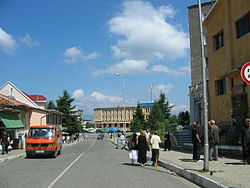Pukë
You can helpexpand this article with text translated fromthe corresponding articlein Albanian.(March 2018)Click [show] for important translation instructions.
|
Pukë
Puka | |
|---|---|
 City Center of Pukë | |
| Coordinates:42°03′N19°54′E/ 42.050°N 19.900°E | |
| Country | |
| County | Shkodër |
| Government | |
| •Mayor | Rrok Dodaj (BF) |
| Area | |
| • Municipality | 505.83 km2(195.30 sq mi) |
| Elevation | 890 m (2,920 ft) |
| Population (2011) | |
| • Municipality | 11,069 |
| • Municipality density | 22/km2(57/sq mi) |
| • Municipal unit | 3,607 |
| Demonym(s) | Albanian:Pukjan (m), Pukjane (f) |
| Time zone | UTC+1(CET) |
| • Summer (DST) | UTC+2(CEST) |
| Postal Code | 4401 |
| Area Code | (0)212 |
| Website | bashkiapuke |
| Part of a series on |
| Albanian tribes |
|---|
 |
Pukë(Albaniandefinite form:Puka) is a town and municipality in northernAlbania.It was formed at the 2015 local government reform by the merger of the former municipalitiesGjegjan,Pukë,Qelëz,QerretandRrapë,that became municipal units. The seat of the municipality is the town Pukë.[1]The total population is 11,069 (2011 census),[2]in a total area of 505.83 km2.[3]The population of the former municipality at the 2011 census was 3,607.[2]
At 838 metres above sea level, the town is one of the highest in elevation in Albania and a well-known ski area. It is 150 km from Albania's capital,Tirana.
Etymology
[edit]The toponym may derive fromLatinvia publica( "public road" ) as it was located on an old trade route.[4]
History
[edit]The settlement is inhabited by the tribe ofPuka,[5]itself one of the "seven tribes of Puka" (Albanian:shtatë bajrakët e Pukës).[4]According to tradition, collected byHyacinthe Hecquardin the mid-19th century, the settlement of Puka had been founded by a Paolo Zenta, who according to Marin Barletius was a relative ofLekë Dukagjini.[5]
The region also has its ownKanun,a set of traditional Albanian laws,[6]and is known asKanuni i Pukës(English:Canon of Pukë) and used mainly inNorthern AlbaniaandKosovo.
In the 20th century, Pukë was expanded as a military base and a centre ofCatholic education.The distinguished Albanian poetMigjenitaught in the town from 1936 to 1937.[7]
Pukë is surrounded by a 400-hectare (1.5 sq mi)pine-coatedmassif.
As in other parts of Europe, climate change has extended and consolidated the range of thepine processionarymoths, who defoliate pines, including in the pinelands of northern Albania.[8]
Economy
[edit]Presently one of Albania’s poorest settlements, approximately two-thirds of Puka’s residents live on social welfare and the municipality is in debt. Alongside that many of its inhabitants have emigrated, mostly to Tirana and abroad, notably England.[9]
The hotel standing in the town square has been upgraded and now boasts a microbrewery producing Puka Beer, which is a lager in draught form. The localfootballclub isKF Tërbuni Pukë.
Mayors
[edit]| No. | Name | Term in office |
|---|---|---|
| 1 | Halit Topalli | 1992–1996 |
| 2 | Halit Furriku | 1996–2000 |
| 3 | Ndue Cara | 2000–2003 |
| 4 | Rrustem Strugaj | 2003–2011 |
| 5 | Beqir Arifaj | 2011–2015 |
| 6 | Gjon Gjonaj | 2015-2023 |
| 7 | Rrok Dodaj | 2023 (Incumbent) |
Notable people
[edit]- Etilda Gjonaj- politician, lawyer, and professor
- Altin Lala- former captain ofAlbania national football teamandHannover 96
- Kristjan Sokoli-NFLplayer
- Xhovalin Delia- painter
- Fabio Gjonikaj- footballer
- Taulant Marku- footballer
- Sebino Plaku- footballer
- Flavio Prendi- footballer
- Ndoc Mark Gega- patriot
- Millosh Gjergj Nikolla- teacher, poet and writer
Twin towns – sister cities
[edit]Pukë istwinnedwith:
See also
[edit]References
[edit]- ^"Law nr. 115/2014"(PDF)(in Albanian). pp. 6374–6375.Retrieved25 February2022.
- ^ab"Population and housing census - Shkodër 2011"(PDF).INSTAT.Retrieved2019-09-25.
- ^"Correspondence table LAU – NUTS 2016, EU-28 and EFTA / available Candidate Countries"(XLS).Eurostat.Retrieved2019-09-25.
- ^abElsie 2015,p. 178.
- ^abElsie 2015,p. 179.
- ^Sellers, Mortimer;Tomaszewski, Tadeusz (July 23, 2010).The Rule of Law in Comparative Perspective.Springer Netherlands.p. 211.ISBN978-90-481-3749-7.
{{cite book}}:CS1 maint: date and year (link) - ^Elsie, Robert (2010).Historical Dictionary of Albania.Scarecrow Press. pp. 301–302.ISBN9780810873803.
- ^Roques, Alain (2014-10-10).Processionary Moths and Climate Change: An Update.Springer. pp. 7–8, 126.ISBN978-94-017-9340-7.
- ^Mitevska, Ljiljana.""We are sinking in debts"".WeEffect Global.Retrieved2024-06-27.
- ^"Gemellaggi - Comune di Signa"(in Italian).Retrieved2021-09-14.
Sources
[edit]- Elsie, Robert (2015).The Tribes of Albania: History, Society and Culture.I.B.Tauris.ISBN978-1-78453-401-1.
- Through The Embers of ChaosISBN0-7195-6232-5(2002),Dervla Murphy
The author refers to processionary disease in Pukë on a cycle trip through Albania, including a stay in the town, described on page 213
External links
[edit]- Official website
- Hotel Turizem Puka Official Website
- PukëA Web page dedicated to Pukë and the surrounding area
- Puka Tourist Guide






